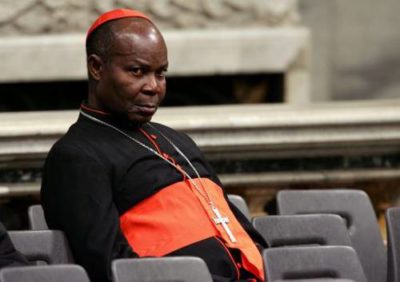
We salute a priest of uncommon courage and candour
His 80th birthday on June 16 was another significant milestone. It has been a long and remarkable journey, considering that he is also celebrating his 50th year as a Catholic priest, having been ordained in December 1966. The double celebration highlights his years of service to humanity, which is an important aspect of priestly functions.
By the time he was proclaimed Cardinal by Pope John Paul II in 2003, he had earned a decent reputation for exemplary priesthood. His elevation to a height that made him eligible for the papacy was a reflection of his recognition in the Catholic Church, which reportedly has over 1.2 billion members worldwide. It is noteworthy that a 2010 estimate put the number of baptised Catholics in Nigeria at 22.6 million.
Significantly, Anthony Cardinal Olubunmi Okogie, the third Nigerian to attain the revered position, is one of only four Nigerians that have been named Cardinal in the history of the Catholic Church in Nigeria. By that honour, Okogie made Nigeria proud.
The importance of his role as Cardinal was underlined by his participation in the election of two Popes. Okogie was one of the cardinal electors who took part in the 2005 papal conclave that chose Pope Benedict XVI; he was also among those that elected Pope Francis in 2013. A striking report said: “During the opening day of the 2013 conclave, Cardinal Okogie was notable in that he was the one cardinal who was in a wheelchair during most of the proceedings, standing up only when it came time for him to walk towards the gospels and make the cardinal electors’ oath.”
It all began with his study of sacred theology at a local seminary, but Okogie’s trajectory also took him to other areas. He experienced the Nigerian Civil War as war-front chaplain, after being drafted into the Nigerian Army, and had a stint as a teacher at King’s College, Lagos.
Interestingly, when he was named Archbishop of Lagos in 1973, it marked the beginning of a social activism that he has carried into his octogenarian phase. That position was the platform on which Okogie became the president of the Christian Association of Nigeria (CAN), apart from heading the Bishops’ Conference of Nigeria from 1994 to 2000.
His heroism in speaking truth to power, especially in the dark era of military dictatorship in Nigeria, lifted him to distinction. Okogie showed extraordinary courage, and his moral voice often represented the conscience of the nation. His conscientious criticism of the establishment and support for progressive causes were uncommon in a country where it is usual for priests to project an insularity that disconnected them from socio-political currents.
With his pastoral governance in Lagos having ended when he reached the age of 75, Okogie nevertheless remains an ethical guide not only in the church but also outside it.
In a recent interview, Okogie displayed the principled spirit that inspired him in his heyday. He had useful words for those present-day priests who seem to be ruled by worldly passions: “I spent eight years as the President of CAN with C. O. Williams (as the National Secretary). Almost everybody in Nigeria, including those outside the country, knew that the association was very powerful. Money – be careful of money! “The love of money is the root of evil,” so the Bible says. We were not thinking about money; we were thinking about the souls of the people and how to improve Nigeria…”
In particular, he showed the direction that Christian leaders in the country should take in their dealings with power, in order to preserve the power and influence of the church. Okogie remarked: “But unfortunately, now they want the money: ‘We are going to have a meeting and some people are coming from Jerusalem. Please sir, help us sir.’ He who pays the piper calls the tune.”

No comments:
Post a Comment